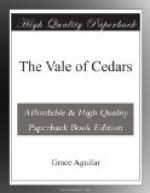Crouching lower and lower at Isabella’s feet, her face half burled in her robe, Marie’s reply was scarcely audible; but the Queen’s brow contracted.
“None?” she repeated almost sternly; “wouldst thou deceive at such a moment? contradict thyself? And yet I am wrong to be thus harsh. Poor sufferer!” she added, tenderly, as she vainly tried to raise Marie from the ground; “thou hast all enough to bear; and if, indeed, the base wretch who has dared thus to trample on the laws alike of God and man, and stain his own soul with the foul blot of midnight assassination, be him whom we have secured, thou couldst not know him as thy husband’s foe. It is all mystery—thine own words not least; but his murder shall be avenged. Ay, had my own kinsman’s been the hand to do the dastard deed.”
“Murder! who was his murderer?” repeated Marie, the horror of such a fate apparently lost in other and more terrible emotion; “who could have raised his sword against my husband? Said I he had no foe? Had he not one, and I, oh, God! did not I create that enmity? But he would not have murdered him; oh, no—no: my liege, my gracious liege, tell me in mercy—my brain feels reeling—who was the murderer?”
“One thou hast known but little space, poor sufferer,” replied the Queen, soothingly; “one whom of all others we could not suspect of such a deed. And even now, though appearances are strong against him, we can scarce believe it; that young foreign favorite of my royal husband, Arthur Stanley.”
“STANLEY!” repeated Marie, in a tone so shrill, so piercing, that the wild shriek which it formed rung for many and many a day in the ears of the Queen. And as the word passed her lips she started to her feet, stood for a second erect, gazing madly on her royal mistress, and then, without one groan or struggle, dropped perfectly lifeless at her feet.
CHAPTER XVI.
List! hear ye, through the still and lonely
night,
The distant hymn of mournful voices
roll
Solemn and low? It is the burial
rite;
How deep its sadness sinks into
the soul,
As slow the passing bell wakes its far
ling’ring knoll.
CHARLES SWAIN.
Spain has often been regarded as an absolute monarchy; an opinion, no doubt, founded on the absolute measures of her later sovereigns. Ferdinand and Isabella certainly laid the foundation of the royal prerogative by the firmness and ability with which they decreased the power of the nobles, who, until their reign, had been like so many petty sovereigns, each with his independent state, and preserving his authority by the sword alone. When Ferdinand and Isabella, however, united their separate kingdoms under one denomination, neither Castile nor Arragon could be considered as an absolute monarchy. In Castile, the people, as representatives of the cities, had, from, early ages, obtained seats in the Cortes, and




